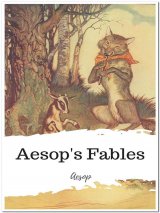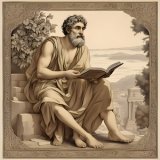Aesop's Fables Page #2
Aesop's Fables, or the Aesopica, is a collection of fables credited to Aesop, a slave and storyteller believed to have lived in ancient Greece between 620 and 564 BCE.
Genre: Children, Fiction
Genre: Children, Fiction
- Year:
- -564
- 2,608 Views
A Wolf came upon a Lamb straying from the flock, and felt some compunction about taking the life of so helpless a creature without some plausible excuse; so he cast about for a grievance and said at last, "Last year, sirrah, you grossly insulted me." "That is impossible, sir," bleated the Lamb, "for I wasn't born then." "Well," retorted the Wolf, "you feed in my pastures." "That cannot be," replied the Lamb, "for I have never yet tasted grass." "You drink from my spring, then," continued the Wolf. "Indeed, sir," said the poor Lamb, "I have never yet drunk anything but my mother's milk." "Well, anyhow," said the Wolf, "I'm not going without my dinner": and he sprang upon the Lamb and devoured it without more ado. THE PEACOCK AND THE CRANE A Peacock taunted a Crane with the dullness of her plumage. "Look at my brilliant colours," said she, "and see how much finer they are than your poor feathers." "I am not denying," replied the Crane, "that yours are far gayer than mine; but when it comes to flying I can soar into the clouds, whereas you are confined to the earth like any dunghill cock." THE CAT AND THE BIRDS A Cat heard that the Birds in an aviary were ailing. So he got himself up as a doctor, and, taking with him a set of the instruments proper to his profession, presented himself at the door, and inquired after the health of the Birds. "We shall do very well," they replied, without letting him in, "when we've seen the last of you." A villain may disguise himself, but he will not deceive the wise. THE SPENDTHRIFT AND THE SWALLOW A Spendthrift, who had wasted his fortune, and had nothing left but the clothes in which he stood, saw a Swallow one fine day in early spring. Thinking that summer had come, and that he could now do without his coat, he went and sold it for what it would fetch. A change, however, took place in the weather, and there came a sharp frost which killed the unfortunate Swallow. When the Spendthrift saw its dead body he cried, "Miserable bird! Thanks to you I am perishing of cold myself." One swallow does not make summer. THE OLD WOMAN AND THE DOCTOR An Old Woman became almost totally blind from a disease of the eyes, and, after consulting a Doctor, made an agreement with him in the presence of witnesses that she should pay him a high fee if he cured her, while if he failed he was to receive nothing. The Doctor accordingly prescribed a course of treatment, and every time he paid her a visit he took away with him some article out of the house, until at last, when he visited her for the last time, and the cure was complete, there was nothing left. When the Old Woman saw that the house was empty she refused to pay him his fee; and, after repeated refusals on her part, he sued her before the magistrates for payment of her debt. On being brought into court she was ready with her defence. "The claimant," said she, "has stated the facts about our agreement correctly. I undertook to pay him a fee if he cured me, and he, on his part, promised to charge nothing if he failed. Now, he says I am cured; but I say that I am blinder than ever, and I can prove what I say. When my eyes were bad I could at any rate see well enough to be aware that my house contained a certain amount of furniture and other things; but now, when according to him I am cured, I am entirely unable to see anything there at all."
Translation
Translate and read this book in other languages:
Select another language:
- - Select -
- 简体中文 (Chinese - Simplified)
- 繁體中文 (Chinese - Traditional)
- Español (Spanish)
- Esperanto (Esperanto)
- 日本語 (Japanese)
- Português (Portuguese)
- Deutsch (German)
- العربية (Arabic)
- Français (French)
- Русский (Russian)
- ಕನ್ನಡ (Kannada)
- 한국어 (Korean)
- עברית (Hebrew)
- Gaeilge (Irish)
- Українська (Ukrainian)
- اردو (Urdu)
- Magyar (Hungarian)
- मानक हिन्दी (Hindi)
- Indonesia (Indonesian)
- Italiano (Italian)
- தமிழ் (Tamil)
- Türkçe (Turkish)
- తెలుగు (Telugu)
- ภาษาไทย (Thai)
- Tiếng Việt (Vietnamese)
- Čeština (Czech)
- Polski (Polish)
- Bahasa Indonesia (Indonesian)
- Românește (Romanian)
- Nederlands (Dutch)
- Ελληνικά (Greek)
- Latinum (Latin)
- Svenska (Swedish)
- Dansk (Danish)
- Suomi (Finnish)
- فارسی (Persian)
- ייִדיש (Yiddish)
- հայերեն (Armenian)
- Norsk (Norwegian)
- English (English)
Citation
Use the citation below to add this book to your bibliography:
Style:MLAChicagoAPA
"Aesop's Fables Books." Literature.com. STANDS4 LLC, 2024. Web. 26 Apr. 2024. <https://www.literature.com/book/aesop%27s_fables_316>.




Discuss this Aesop's Fables book with the community:
Report Comment
We're doing our best to make sure our content is useful, accurate and safe.
If by any chance you spot an inappropriate comment while navigating through our website please use this form to let us know, and we'll take care of it shortly.
Attachment
You need to be logged in to favorite.
Log In